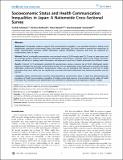| dc.contributor.author | Ishikawa, Yoshiki | |
| dc.contributor.author | Nishiuchi, Hiromu | |
| dc.contributor.author | Hayashi, Hanae | |
| dc.contributor.author | Viswanath, Kasisomayajula | |
| dc.date.accessioned | 2013-04-03T20:44:08Z | |
| dc.date.issued | 2012 | |
| dc.identifier.citation | Ishikawa, Yoshiki, Hiromu Nishiuchi, Hana Hayashi, and Kasisomayajula Viswanath. 2012. Socioeconomic status and health communication inequalities in Japan: a nationwide cross-sectional survey. PLoS ONE 7(7): e40664. | en_US |
| dc.identifier.issn | 1932-6203 | en_US |
| dc.identifier.uri | http://nrs.harvard.edu/urn-3:HUL.InstRepos:10497293 | |
| dc.description.abstract | Background: Considerable evidence suggests that communication inequality is one potential mechanism linking social determinants, particularly socioeconomic status, and health inequalities. This study aimed to examine how dimensions of health communication outcomes (health information seeking, self-efficacy, exposure, and trust) are patterned by socioeconomic status in Japan. Methods: Data of a nationally representative cross-sectional survey of 2,455 people aged 15–75 years in Japan were used for secondary analysis. Measures included socio-demographic characteristics, subjective health, recent health information seeking, self-efficacy in seeking health information, and exposure to and trust in health information from different media. Results: A total of 1,311 participants completed the questionnaire, giving a response rate of 53.6%. Multivariate logistic regression revealed that education and household income, but not employment, were significantly associated with health information seeking and self-efficacy. Socioeconomic status was not associated with exposure to and trust in health information from mass media, but was significantly associated with health information from healthcare providers and the Internet. Conclusion: Health communication outcomes were patterned by socioeconomic status in Japan thus demonstrating the prevalence of health communication inequalities. Providing customized exposure to and enhancing the quality of health information by considering social determinants may contribute to addressing social disparities in health in Japan. | en_US |
| dc.language.iso | en_US | en_US |
| dc.publisher | Public Library of Science | en_US |
| dc.relation.isversionof | doi:10.1371/journal.pone.0040664 | en_US |
| dc.relation.hasversion | http://www.ncbi.nlm.nih.gov/pmc/articles/PMC3395686/pdf/ | en_US |
| dash.license | LAA | |
| dc.subject | Medicine | en_US |
| dc.subject | Clinical Research Design | en_US |
| dc.subject | Cross-Sectional Studies | en_US |
| dc.subject | Non-Clinical Medicine | en_US |
| dc.subject | Health Care Policy | en_US |
| dc.subject | Health Education and Awareness | en_US |
| dc.subject | Medical Communication | en_US |
| dc.subject | Socioeconomic Aspects of Health | en_US |
| dc.subject | Public Health | en_US |
| dc.subject | Behavioral and Social Aspects of Health | en_US |
| dc.subject | Social and Behavioral Sciences | en_US |
| dc.subject | Media Studies | en_US |
| dc.title | Socioeconomic Status and Health Communication Inequalities in Japan: A Nationwide Cross-Sectional Survey | en_US |
| dc.type | Journal Article | en_US |
| dc.description.version | Version of Record | en_US |
| dc.relation.journal | PLoS ONE | en_US |
| dash.depositing.author | Viswanath, Kasisomayajula | |
| dc.date.available | 2013-04-03T20:44:08Z | |
| dc.identifier.doi | 10.1371/journal.pone.0040664 | * |
| dash.contributor.affiliated | Hayashi, Hanae | |
| dash.contributor.affiliated | Viswanath, Kasisomayajula | |


